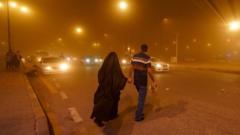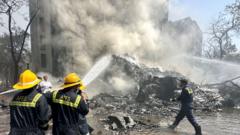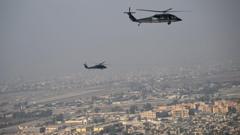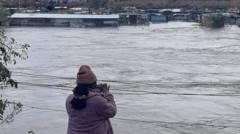A recent sandstorm in Iraq's central and southern regions has reportedly caused respiratory distress for over a thousand people, prompting health officials to issue alerts as hospitals are overwhelmed.
Iraq's Respiratory Crisis: Thousands Affected by Sandstorm

Iraq's Respiratory Crisis: Thousands Affected by Sandstorm
Severe dust storm in Iraq leaves over 1,000 residents seeking medical help for breathing issues.
More than 1,000 residents in Iraq have been affected by a significant sandstorm that swept through the country's central and southern regions, leading to numerous respiratory problems. Health officials confirmed that the storm resulted in at least 700 reported cases of suffocation in Muthanna province, with local footage showing areas engulfed in an alarming orange haze and severe visibility issues.
The recent storm, which is not uncommon in Iraq, raised concerns regarding the increasing frequency of such weather events, which many experts attribute to climate change. The Iraqi environment ministry has issued warnings that the country may endure more "dust days" in the coming years.
Among the hardest-hit regions, hospitals in Muthanna province recorded a surge in emergency cases, with over 250 patients in Najaf and 322 individuals, including children, in Diwaniyah seeking urgent medical attention. Additionally, Dhi Qar and Basra provinces reported over 530 instances of breathing difficulties among locals.
Visibility drops to less than one kilometer due to the dense haze, attributing to the shutdown of crucial airports in Najaf and Basra as a precautionary measure. Authorities and health officials advised pedestrians and police to wear masks to shield themselves from the hazardous air quality. Though conditions are anticipated to improve by Tuesday morning, the situation underscores Iraq's vulnerability to environmental challenges.
The United Nations ranks Iraq among the five countries most susceptible to the impacts of climate change, further complicating the nation's struggles with sandstorms, extreme heat, and dwindling water supplies. A similar sandstorm in 2022 resulted in one fatality and over 5,000 people requiring treatment due to respiratory complications. The ongoing crisis has ignited discussions on Iraq's need to adapt to the accelerating effects of climate change and mitigate its impact on public health.




















